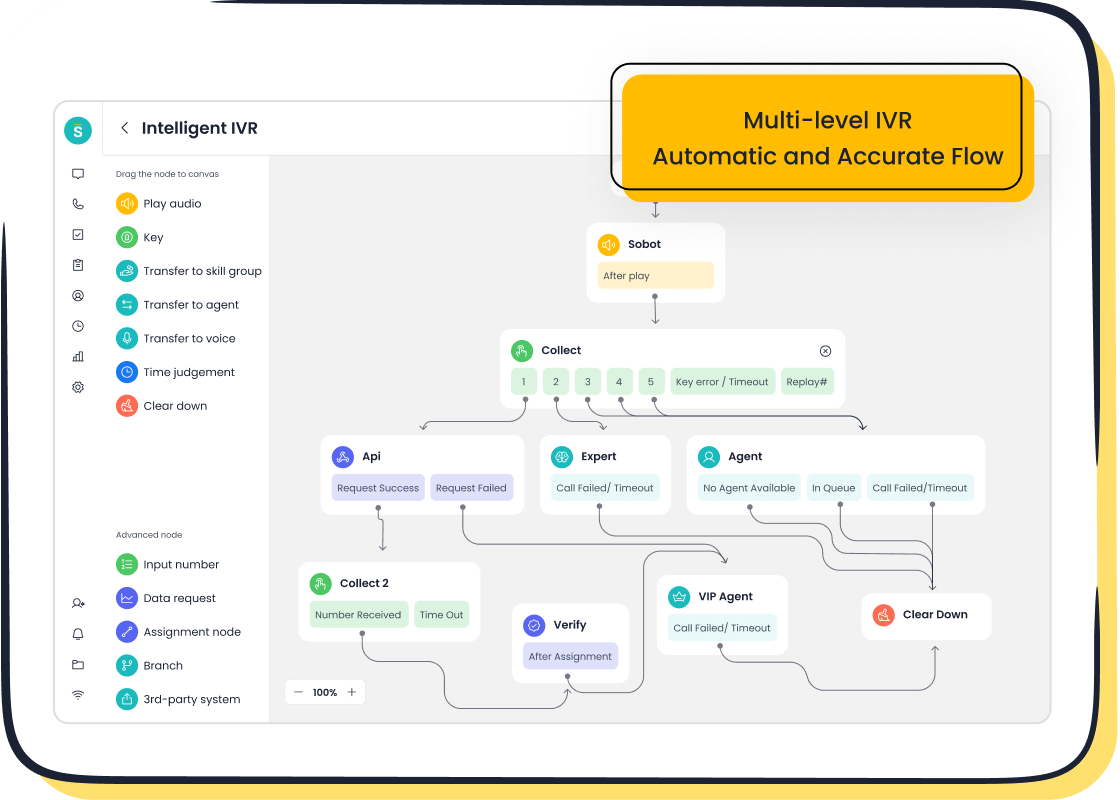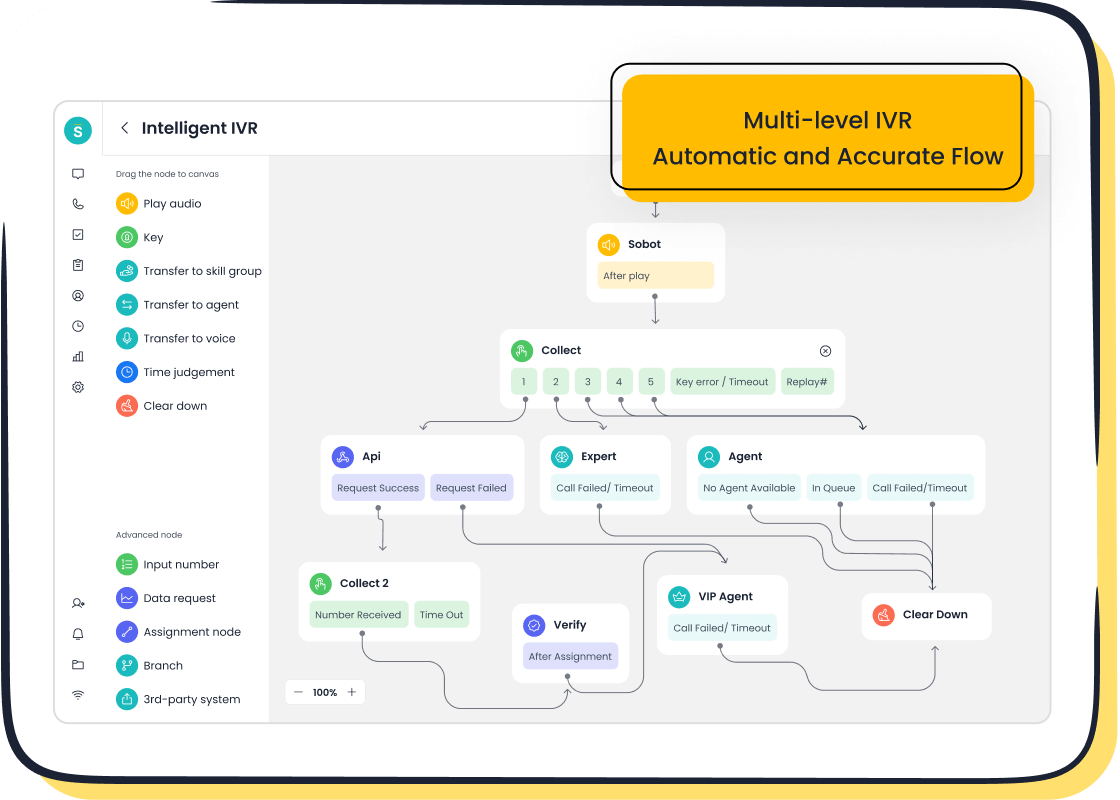How to Start Your Call Center Quality Assurance Analyst Journey in 2025

You can start your call center quality journey in 2025 with the right mindset and determination. Learn how call center quality assurance shapes customer satisfaction and builds trust. Develop your skills, seek quality assurance training, and use the latest technology. Sobot AI and Sobot call center tools help you analyze and improve every customer interaction. Anyone with a passion for call center quality can grow in this field.
Role in Call Center Quality

Analyst Responsibilities
As a call center quality assurance analyst, you play a key role in making sure every customer interaction meets high standards. You review customer service calls and listen for clear communication, helpful answers, and a positive attitude. You use call monitoring tools to check if agents follow company policies and deliver great service. Your job also includes giving feedback to agents, helping them improve their skills, and supporting training programs.
You handle three main areas in your daily work:
- Customer Service/Satisfaction: You review agent interactions, give feedback, and help with customer engagement strategies. Sometimes, you help solve tough customer problems.
- Technical: You track call center quality metrics, analyze data, and write reports. You recommend new software or training when you see a need.
- Business Process/Operations: You help create process controls and standard operating procedures (SOPs). You make sure everyone follows the rules and support new team members during onboarding.
Tip: Good analysts use both technical and people skills. You need to think critically, solve problems, and communicate clearly.
Impact on Customer Service
Your work as a call center quality analyst has a big impact on customer service. When you monitor calls and give feedback, you help agents grow. This leads to better customer experiences and higher satisfaction scores. You also spot trends in customer needs, which helps the company improve its services.
By focusing on call center quality, you help the team reach business goals. You make sure customers get fast, friendly, and accurate help. Over time, your efforts build trust and loyalty. Companies that invest in call center quality assurance often see fewer complaints and more repeat customers.
Skills and Qualifications
Essential Skills
You need a strong set of skills to succeed as a call center quality assurance analyst. Communication stands out as the most important. You must listen carefully, give clear feedback, and write reports that others can understand. Analytical thinking helps you spot trends and solve problems quickly. Attention to detail ensures you catch small mistakes that could affect the quality program.
You also need to understand quality management. This means knowing how to measure performance, set goals, and track progress. Time management helps you handle many tasks at once. You should feel comfortable using technology, especially call monitoring tools and data analysis software. If you want to create a qa program, teamwork and leadership skills will help you guide others and improve the quality management process.
Tip: Practice active listening and ask questions during team meetings. This helps you learn more about quality management and builds trust with your team.
Education and Certifications
Most successful analysts have a solid educational background. You do not need a specific degree, but certain fields help you stand out. Here are some common backgrounds:
- About 65% of analysts hold a bachelor's degree.
- Around 15% have a master's degree, which can help you move up in your career.
- Popular majors include business, computer science, and information technology.
- Degrees in engineering or related areas also support your growth.
- Interdisciplinary studies in project management or business strategy add value.
A certification can boost your resume. Industry standards include:
- Certified Call Centre Associate (CCCA)
- Certified Call Centre Manager (CCCM)
- Certified Customer Service Professional (CCSP)
These programs teach you about customer service, management, and quality management. They show employers you have the skills to support a quality program.
Quality Assurance Training
Quality assurance training gives you the tools to succeed. You can take a course online or in person. Many programs cover topics like call evaluation, feedback methods, and quality management systems. Some courses focus on using technology to track and improve performance.
Look for a course that includes hands-on practice. This helps you apply what you learn right away. Many training programs also offer a certification when you finish. This shows you have completed a quality assurance training program and are ready to help your team reach its goals.
Note: Many companies offer their own training programs. Ask your manager about options to join a quality management course or workshop.
Getting Started in Call Center Quality Assurance
Entry-Level Experience
You can start your journey in call center quality assurance by gaining entry-level experience. Many analysts begin as call center agents. This role helps you understand customer service basics and call center operations. You learn how to handle customer questions, solve problems, and follow company guidelines. You also see how teams work together to meet goals.
You should focus on learning how calls are managed. Pay attention to how supervisors monitor calls and give feedback. Ask questions about quality standards and how agents improve their performance. You can volunteer for extra tasks, such as helping with call reviews or joining team meetings about quality improvement.
Tip: If you want to stand out, show interest in quality assurance tasks. Ask your supervisor if you can help with call evaluations or data analysis.
You can also look for internships in customer service or call center operations. Many companies offer programs for students or recent graduates. These internships teach you about call center technology, customer satisfaction, and quality assurance processes. You gain hands-on experience and build your resume.
Here is a simple path you can follow:
| Step | What You Learn | How It Helps You Grow |
|---|---|---|
| Call Center Agent | Customer service, call handling | Builds basic skills |
| Intern/Volunteer | Quality assurance, data analysis | Adds hands-on experience |
| Team Support | Call monitoring, feedback | Prepares you for analyst role |
You should keep track of your achievements. Write down examples of how you helped customers or improved team performance. These stories help you during job interviews for quality assurance analyst positions.
Sobot Voice/Call Center Tools

You can boost your skills by using advanced call center tools. Sobot offers a Voice/Call Center platform that helps you learn about call monitoring and analysis. This platform supports smart inbound and outbound calls, intelligent IVR, and unified workspaces for agents. You can practice handling calls, reviewing recordings, and analyzing call data.
Sobot’s system provides real-time monitoring and reporting. You can see how agents perform and track key metrics, such as average handle time and first-contact resolution. The platform also includes AI-powered voicebots that help you understand intent recognition and automated customer interactions. You can use these features to learn how technology improves call center quality assurance.
Note: Sobot’s Voice/Call Center platform has a 99.99% uptime and supports global telephony contacts. You can access the system on mobile devices, which makes it easy to practice anywhere.
You should explore the drag-and-drop IVR builder. This tool lets you customize call flows and greetings. You can experiment with routing calls to different teams or agents. You also learn how to set up bulk outbound tasks and assign leads based on priorities.
Here are some features you can use for hands-on learning:
- Call Recording and Transcription: Review calls and practice giving feedback.
- Real-Time Analytics: Track performance and spot trends.
- Unified Workspace: Manage customer information and call history.
- AI Voicebot: Test automated responses and intent recognition.
You can visit Sobot’s Voice/Call Center page to learn more about these tools. Many companies trust Sobot for their call center operations, including well-known brands in retail, finance, and technology.
Tip: If your company uses Sobot, ask your manager for access to the platform. You can request training or join workshops to learn more about its features.
Course and Certification Options
You should consider enrolling in a course to build your knowledge. Many online and in-person courses teach you about call center quality assurance. These courses cover topics such as call evaluation, feedback methods, and quality management systems. You learn how to use technology to track performance and improve customer service.
A comprehensive course often includes hands-on practice. You can work with real call data, review recordings, and write reports. Some courses offer simulations using platforms like Sobot, which helps you apply what you learn in real-world scenarios.
You should look for a training course that matches your career goals. Many programs offer a certification when you finish. A quality assurance certification shows employers you have the skills to support their quality program. Popular certifications include Certified Call Centre Associate (CCCA), Certified Call Centre Manager (CCCM), and Certified Customer Service Professional (CCSP).
Here is a checklist to help you choose the right course:
- Does the course include hands-on practice?
- Will you learn about call monitoring and feedback?
- Does the course cover technology like Sobot’s Voice/Call Center platform?
- Will you earn a certification after completion?
- Is the course recognized by industry leaders?
Note: You can find many courses online. Websites like Coursera, Udemy, and LinkedIn Learning offer programs in call center quality assurance. You can also check with local colleges or training centers.
You should keep learning even after you finish your course. Many analysts join workshops or webinars to stay updated on new trends. You can also connect with other professionals through online forums or social media groups.
If you want to advance your career, combine your course knowledge with hands-on experience using Sobot’s tools. This approach helps you become a valuable team member and prepares you for future leadership roles.
Tip: After earning your certification, update your resume and LinkedIn profile. Highlight your course achievements and experience with Sobot’s platform.
Gaining Experience in Contact Center Quality Assurance

Internships and Volunteering
You can build your skills in contact center quality assurance by joining internships or volunteering programs. Many companies offer internships for students or recent graduates who want to learn about customer service and quality monitoring. You get a chance to work with experienced teams and see how a quality monitoring program operates in real life. You learn how to review calls, analyze customer feedback, and support agents as they improve their service.
Internships often last a few months. You might help with call evaluations, prepare reports, or assist with training sessions. Some companies let you shadow quality assurance analysts. You watch how they monitor calls and give feedback. You also learn how to use technology to track performance and spot trends.
Volunteering gives you another way to gain experience. You can offer to help with quality assurance tasks at local businesses, non-profits, or community organizations. Many places need help with customer service and call monitoring. You might review customer interactions, organize training materials, or help with data entry. Volunteering shows you care about learning and want to support a team.
Tip: Keep a journal of your internship or volunteer work. Write down what you learn each week. Record examples of how you helped improve customer service or supported a quality monitoring program. These stories help you during job interviews.
Here is a table to help you compare internships and volunteering:
| Experience Type | What You Do | Skills You Gain | How It Helps Your Career |
|---|---|---|---|
| Internship | Call reviews, report writing | Data analysis, teamwork | Builds professional network |
| Volunteering | Training support, call monitoring | Communication, problem-solving | Shows initiative and passion |
You should look for internships or volunteer opportunities at companies that use advanced contact center solutions. Many organizations now use omnichannel platforms to manage customer interactions. You get to see how technology supports quality assurance and helps teams deliver better service.
Real-World Practice with Sobot
You can gain real-world experience by using Sobot’s omnichannel solutions. Sobot provides a unified workspace for agents and analysts. You can manage calls, chats, emails, and social media messages in one place. This helps you understand how modern contact centers operate and how teams use technology to improve customer satisfaction.
Sobot’s platform lets you practice quality monitoring in real time. You can review call recordings, analyze chat transcripts, and track key metrics like average handle time and first-contact resolution. The system uses AI-powered chatbots and voicebots to automate simple tasks. You learn how automation supports agents and improves efficiency.
Sobot’s omnichannel solution supports multiple industries, including retail, finance, gaming, and education. You can see how different companies use the platform to solve customer problems and deliver fast, personalized service. Sobot’s analytics tools help you spot trends and measure performance. You can create reports and share feedback with your team.
Note: Sobot’s system handles over 6 million online communications and 3 million phone calls every day. The platform has a 99.99% uptime, so you can rely on it for stable and secure practice. Learn more about Sobot’s omnichannel solution at Sobot Omnichannel Solution.
You can ask your manager for access to Sobot’s training modules. Many companies offer workshops or webinars that teach you how to use the platform. You might join a simulation where you review customer interactions and give feedback. You learn how to set up a quality monitoring program and track progress over time.
Here are some ways to practice with Sobot:
- Review call and chat transcripts for quality.
- Use analytics to spot trends in customer feedback.
- Test AI-powered chatbots and voicebots.
- Create reports and share insights with your team.
- Experiment with routing calls and messages to different agents.
Tip: If your company uses Sobot, join team meetings about quality assurance. Ask questions about how the platform supports the quality monitoring program. Offer to help with data analysis or report writing.
Sobot’s omnichannel solution helps you understand how technology shapes contact center quality assurance. You see how automation, analytics, and unified workspaces make teams more efficient. You learn how to support agents and improve customer satisfaction using real-world tools.
Building a Professional Network
You can grow your career by building a professional network in the customer service industry. Networking helps you learn from others, find new opportunities, and stay updated on trends in contact center quality assurance. You meet people who work in different roles, such as analysts, trainers, managers, and technology specialists.
Start by joining online forums and social media groups focused on customer service and quality assurance. LinkedIn has many groups where professionals share tips, job openings, and industry news. You can ask questions, join discussions, and connect with experts. You might find mentors who guide you as you build your skills.
Attend industry events, workshops, and webinars. Many organizations host conferences about customer service and contact center technology. You can listen to speakers, join training sessions, and meet people from leading companies. Sobot often participates in industry events and offers webinars about omnichannel solutions and quality monitoring. You can learn about new tools and best practices.
Tip: After meeting someone at an event or online, send a follow-up message. Thank them for their time and ask if you can stay in touch. Building relationships helps you find job leads and learn about new programs.
You can also network within your company. Join team meetings, volunteer for projects, and ask for feedback from managers and analysts. Offer to help with training sessions or quality monitoring tasks. You show your interest in learning and support your team’s goals.
Here is a simple list to help you build your network:
- Join online groups and forums.
- Attend industry events and webinars.
- Connect with mentors and experts.
- Volunteer for projects at work.
- Share your achievements and ask for feedback.
Networking helps you discover new ways to improve your skills. You learn about different quality monitoring programs and how companies use technology to support customer service. You find out about job openings, internships, and training courses. You also build confidence as you share your experiences and learn from others.
Note: Many professionals in contact center quality assurance use Sobot’s solutions. You can ask them about their experiences and learn how the platform supports their quality monitoring program.
Building a strong network helps you grow in your career. You stay updated on industry trends, learn new skills, and find opportunities to advance. You become part of a community that values customer service and quality assurance.
Advancing Your Call Center Quality Assurance Career
Resume and Interview Tips
You can stand out as a quality management specialist by building a strong resume. Start by listing your experience with call center operations and quality management. Show your skills in call monitoring, feedback, and data analysis. If you have used Sobot’s Voice/Call Center platform, mention it. Many companies look for people who know advanced tools.
When you write your resume, use clear action words. For example, say “monitored calls for quality management” or “improved agent performance with feedback.” Add your certifications, such as Certified Call Centre Associate or training and quality specialist programs. List any hands-on experience with Sobot’s unified workspace or AI-powered voicebot.
During interviews, prepare to talk about your role in quality management. Share examples of how you helped teams improve customer satisfaction. You can use stories from internships, volunteering, or real-world practice with Sobot. Show that you understand how technology supports quality management and customer service.
Tip: Practice answering questions about quality management. Use the STAR method (Situation, Task, Action, Result) to organize your answers.
Continuous Learning
You need to keep learning to grow in quality management. The contact center industry changes fast. New tools and methods appear every year. Sobot offers training modules and webinars to help you stay updated. You can join workshops on AI, analytics, and omnichannel solutions.
Read articles and case studies about quality management. Many experts share tips on how to improve call center operations. You can join online forums or groups for quality management professionals. These groups help you learn new skills and share ideas.
Note: Continuous learning helps you move from agent to specialist. You can become a leader in quality management by staying curious and open to new ideas.
Leveraging Sobot Solutions
Sobot solutions help you advance your career in quality management. The Voice/Call Center platform gives you real-time analytics and call monitoring. You can track key metrics and spot trends. The unified workspace lets you manage customer data and call history in one place.
Sobot’s omnichannel solution supports quality management across voice, chat, and social media. You can practice using AI-powered chatbots and voicebots. These tools help you automate simple tasks and focus on complex quality management issues. Sobot’s analytics tools give you insights to improve team performance.
Many companies trust Sobot for quality management. You can use Sobot’s training resources to learn new features. This hands-on experience makes you a valuable asset to any team. You can read more about Sobot’s solutions on their official website.
Tip: Ask your manager for access to Sobot’s training and quality specialist programs. These programs help you master quality management and prepare for leadership roles.
You can start your call center quality journey by understanding the role, building your skills, and gaining real experience. Use advanced tools like Sobot to practice and improve. Take action today—enroll in a course or explore Sobot’s solutions. Stay curious and keep learning. The contact center industry changes fast, so adaptability helps you grow. Begin your path to success in call center quality now.
FAQ
What does a call center quality assurance analyst do every day?
You review calls, analyze customer interactions, and give feedback to agents. You track performance metrics like customer satisfaction scores. You help teams improve service. You use tools such as Sobot’s Voice/Call Center platform to monitor and report on quality. Learn more about analyst roles.
How can you start a career in call center quality assurance?
You begin as a call center agent or intern. You learn call center operations and customer service basics. You take quality assurance training and earn certifications. You practice using platforms like Sobot to gain hands-on experience. You build your resume with real examples.
Why is call center quality assurance important for customer service?
Call center quality assurance helps you spot problems and improve agent performance. You increase customer satisfaction and loyalty. Companies with strong quality assurance programs see fewer complaints and higher Net Promoter Scores (NPS). See NPS data.
What skills do you need for call center quality assurance?
You need strong communication, attention to detail, and analytical thinking. You must understand call center technology and quality management. You use tools like Sobot’s omnichannel solution to track trends and measure results. You also need teamwork and leadership skills.
How does Sobot help with call center quality assurance?
Sobot provides a unified workspace, real-time analytics, and AI-powered voicebots. You monitor calls, analyze data, and automate simple tasks. Sobot’s platform supports global telephony and offers stable, secure service. You improve call center quality assurance with advanced technology and hands-on practice.
